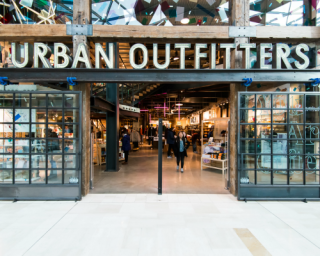
1. Nordstrom (Ranked No. 2)
If there’s one phrase the name Nordstrom is synonymous with, it’s ‘customer service,’ and you don’t get to be the poster child for serving the consumer without gaining ground in personalization along the way. That white-glove attention didn’t subside when the internet came along: if anything the department store retailer has doubled down, finding ways to combine the two into a new breed of customer service that goes above and beyond. Consider that when it opened its long-awaited men’s only store in Manhattan in 2018, it had the hustle and bustle of the city in mind, launching 24/7 BOPIS to allow customers to pick up their purchases at their convenience. It also offered alterations, express returns and personal stylists — who will even come to you in the comfort of your own home. Online, the intelligent homepage personalization, ‘we think you’ll love’ product recommendations and trending location-based style inspiration of its digital offering sent it up six spots from No. 8 last year.
Overall personalization score: 77
2. Rent the Runway (Ranked No. 3)
Rent the Runway has an ace in its bag of personalization tricks that most apparel companies don’t have access to — more data, more detailed data, and different types of data. “In the past,” CEO Jennifer Hyman noted last year, “all a retailer could really tell you was what your sell-through was, but they couldn’t necessarily tell you if the customer actually wore that shirt, how often she wore it, whether it stood the test of time.” Because RtR’s clothes are returned to the company’s processing facility, the company has an intimate connection with them ― it knows what garments require repairs; it knows how many dry cleanings and wearings a garment can withstand before it needs to be retired. That’s valuable data that it can use in a variety of ways to improve the customer experience, both with its online subscription plans and in-store in its physical locations, the fifth of which recently opened in San Francisco, after the company secured a $125 million investment in March. This year, the company that popularized rental e-commerce clothing jumps 23 spots on the index for its approach to personalization, as it has expanded its product offering, from high-end evening gowns to women’s office apparel and now to casualwear.
Overall personalization score: 73
3. DSW (Ranked No. 5)
While some retailers expand by focusing on brand new categories, DSW is doubling down on the tootsies, since last year opening “nail bars” in seven locations. The shoe retailer, which turned 50 this year, hopes the pedicure service will increase loyalty from its 26 million+ members by bringing them back more frequently into the stores. By joining online browsing data with transactional data, DSW can build a more holistic view of the customer, which it is using to understand what she wants, and by gaining one view of the customer across channels, it can be sure it doesn’t send an abandoned cart email message to a consumer who’s already completed the purchase in-store. Additionally, the retailer uses a comprehensive quiz to onboard customers, which it uses to help make attribute-based product recommendations that circulate the homepage and are pushed out to consumers via email at a frequency that complements the customer journey. Likewise, the DSW app features geo-targeted notifications that will ping the consumer if they’re in proximity to a store and have an available reward or offer, reminding them that they might want to come in.
Overall personalization score: 67
4. Urban Outfitters (Ranked No. 7)
In Q4 of the most recent fiscal year, Urban delivered double-digit growth in the digital channel, driven by increases in sessions, conversion and average order value. Loyalty really works: Urban boasts 8.3 million followers on Instagram; its popular loyalty program, UO Rewards, has about 10 million members worldwide, who accounted for more than 70 percent of the brand’s sales during that quarter. That might be because the UO program richly rewards its members with exclusive offers, special prizes, early access to sales, extra discounts and other perks. Its 4.9-rated app, (which will get you even more goodies) offers a highly personalized feed, and its dynamic and customizable features make it easy to search for what you want. Urban Outfitters, which will hit the half-century mark next year, has always brought together an eclectic mix of items, and it expanded that last year with its UO MRKT, a curated third-party marketplace connecting its community with an evolving lineup of “culturally-minded brands and new discoveries.” The retailer also started accepting Apple pay and Afterpay, a buy-now, pay-later platform. Urban Outfitters omnichannel experience also features personalized emails, engaging and relevant editorial, and a well-timed cadence of communications.
Overall personalization score: 66
5. Adidas (Ranked No. 9)
The sneaker retailer tapped into something big when it launched its Yeezy collection, a multi-year collaboration with rapper Kanye West, several years ago, and now everyone’s waiting to see what adidas has in store for its partnership with Beyonce. So far, the company is staying mum about the upcoming launch. Adidas also builds connection with its customers by using data to give shoppers the information they need, whether that’s through its expansive product search and filtering criteria capabilities or via apps that cater to individual interests, from health and fitness goals (Runtastic), to building soccer skills (Tango App). Overall its omnichannel approach is paying off — with gross margin forecast to increase this year to around 52 percent.
Post time: Jun-14-2022